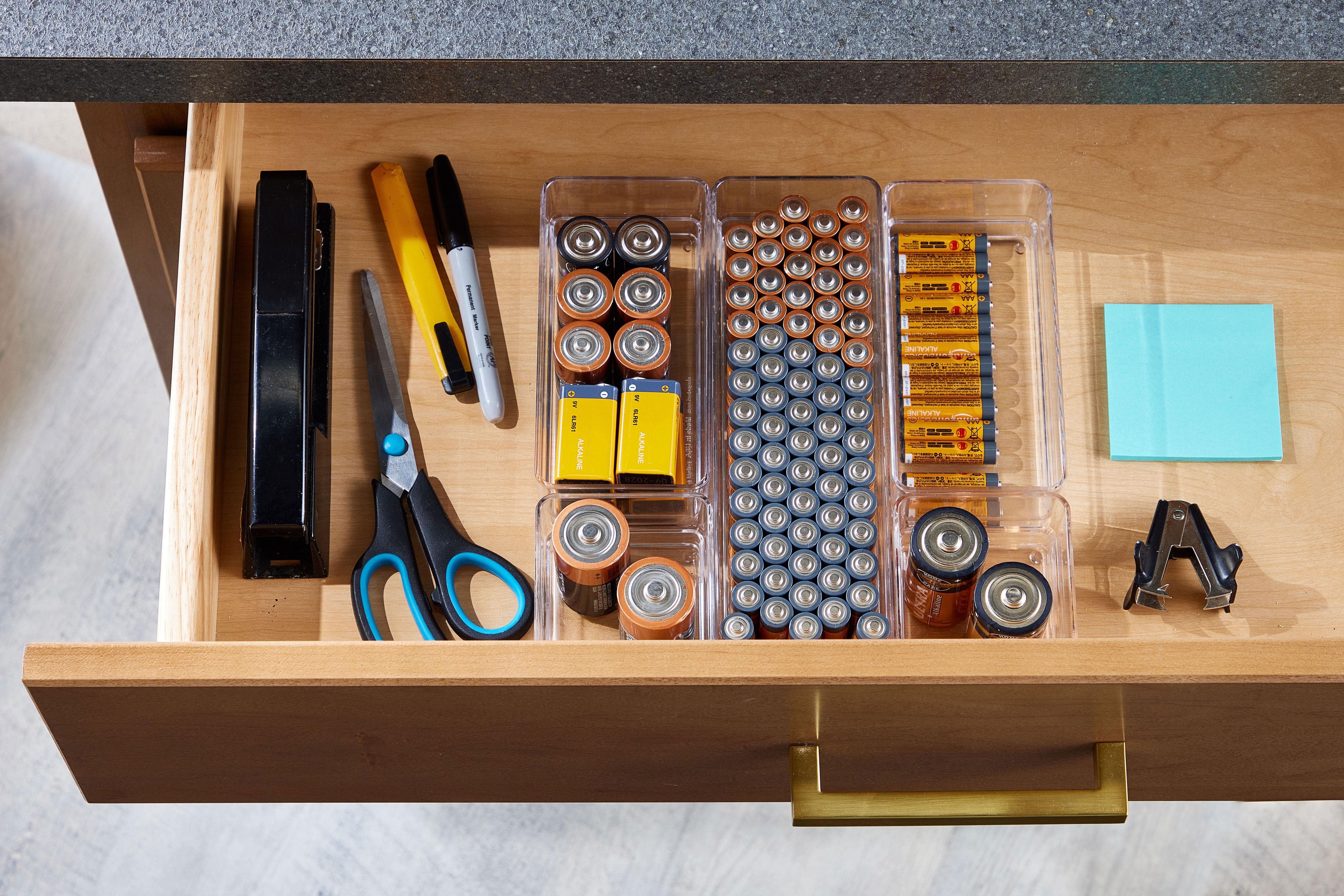Whether you use regular batteries or have invested in the rechargeable kind, they all eventually run out of juice and need to be disposed of—and, no, letting them linger in and clutter up your junk drawer doesn’t count.
Tossing dead batteries in the trash might seem tempting, but it’s actually unsafe for both you and the environment. Not only that, it can actually be illegal to do so depending on where you live. Learn why most batteries should never be casually discarded, and get safe, practical solutions for proper disposal and recycling.
Why Can't You Throw Away Batteries?
Batteries should never go out with your regular trash, for the safety of you, your home, and the environment. These are a few of the reasons why you shouldn't dispose of them yourself. If you're on the fence about whether it's legal in your location, it's important to consult your local waste management company to understand what is allowed and what isn’t.
It’s Unsafe for the Environment
Many types of batteries contain chemicals or heavy metals such as lead, cadmium, mercury, nickel, and silver. These substances are toxic to both humans and animals and can pose health risks if released into the environment. When disposed of in a landfill, batteries can eventually corrode and break open, releasing harmful chemicals into the soil. These toxins may then reach and seep into nearby water sources, contaminating drinking water and local ecosystems.
It Poses a Fire Risk
Lithium-ion batteries, which are used to power most of our electronics today, such as smartphones, tablets, and laptops, have a known risk of catching fire or exploding if they are damaged or improperly disposed of. As the EPA also reports, these batteries can overheat, particularly if they are punctured or compressed in garbage trucks or landfills.
It Can Be Illegal
Improper disposal of batteries can be illegal, depending on where you live. Some states, like California, have strict rules regarding battery recycling, while others leave the lawmaking up to local authorities. You may find that your town allows standard household batteries made of alkaline or zinc-carbon (for example, AA, AAA, C, D, and 9-volt batteries) to be discarded in the trash.
Even in areas with more relaxed regulations, it’s considered illegal to toss certain types of batteries, such as rechargeable and car batteries. Since the metals and chemicals found in batteries are seen as hazardous waste, most municipalities require them to be taken to an approved recycling or disposal facility.
How to Safely Dispose of Batteries
If you can't throw batteries in the trash, how do you get rid of them? Follow these steps to identify and learn where drop off your stash. Following these guidelines also helps prevent accidents during transport and makes it easier for recycling centers to process the materials.
Step 1: Identify the Battery Type
First, figure out the type of battery you have to determine the proper disposal method.
- Alkaline batteries, like AA, AAA, C, D, 9V: These are some of the most common batteries you might use around your home, like in flashlights and remote controls. While many places permit you to dispose of them in the regular trash, some areas encourage or require special recycling. It's always best to check with your local waste management company first. If recycling is necessary, you can often request a mail-in kit to collect single-use batteries to send back for proper recycling.
- Rechargeable batteries, like Ni-MH (Nickel-Metal Hydride), Ni-Cd (Nickel-Cadmium), Li-ion (Lithium-Ion): Found in power tools, cameras, and laptops, these should never go in the trash can. They’re recyclable and often collected by electronics stores.
- Button cell or coin batteries: Used in watches, hearing aids, and small electronics, these often contain silver or mercury and must be treated as hazardous waste.
- Lead-acid batteries: These are what car batteries (and some lawn equipment batteries) are made of and contain lead and sulfuric acid. Car batteries must be taken to a recycling facility or returned to the retailer.
Step 2: Find a Drop-Off Location
Fortunately, many national retailers accept used rechargeable batteries, so you can drop them off while running errands. Stores like Best Buy, Home Depot, and Lowe’s offer free battery recycling bins for consumers at various locations. Programs like Call2Recycle partner with these retailers to provide accessible recycling options for rechargeable batteries. You can also visit Earth911 to find the closest recycling center to you, especially if you’re looking to offload something else, such as button cell batteries. If you have a car battery to dispose of, it’s a good idea to contact the manufacturer or the dealer where you purchased the car to inquire about how to do so.
You may want to check if your local government provides a residential battery recycling program. Some cities allow residents to place batteries in a sealed plastic bag and leave them out with their recycling bins. Other areas might host periodic hazardous waste collection events. To find out what options are available in your area, visit your city or county's waste management website.
Step 3: Safely Store and Transport Batteries
Before recycling, here are a few precautions you can take to ensure the safety of yourself and others:
- Bind the lithium-ion and 9-volt battery terminals with electrical tape to prevent short-circuiting and, therefore, a fire risk.
- While waiting to be recycled, always store used batteries in a cool, dry place away from flammable materials.
- Keep batteries separated by type in either small cardboard boxes or plastic containers. You can easily drop them off at a retailer or recycling center as soon as they're full.



